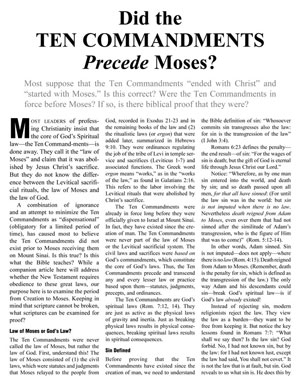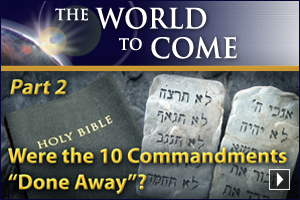Most leaders of professing Christianity insist that the core of God’s Spiritual law—the Ten Commandments—is done away. They call it the “law of Moses” and claim that it was abolished by Jesus Christ’s sacrifice. But they do not know the difference between the Levitical sacrificial rituals, the law of Moses and the law of God.
A combination of ignorance and an attempt to minimize the Ten Commandments as “dispensational” (obligatory for a limited period of time), has caused most to believe the Ten Commandments did not exist prior to Moses receiving them on Mount Sinai. Is this true? Is this what the Bible teaches? While a companion article here will address whether the New Testament requires obedience to these great laws, our purpose here is to examine the period from Creation to Moses. Keeping in mind that scripture cannot be broken, what scriptures can be examined for proof?
Law of Moses or God’s Law?
The Ten Commandments were never called the law of Moses, but rather the law of God. First, understand this! The law of Moses consisted of (1) the civil laws, which were statutes and judgments that Moses relayed to the people from God, recorded in Exodus 21-23 and in the remaining books of the law and (2) the ritualistic laws (or ergon) that were added later, summarized in Hebrews 9:10. They were ordinances regulating the job of the tribe of Levi in temple service and sacrifices (Leviticus 1-7) and associated functions. The Greek word ergon means “works,” as in the “works of the law,” as found in Galatians 2:16. This refers to the labor involving the Levitical rituals that were abolished by Christ’s sacrifice.
The Ten Commandments were already in force long before they were officially given to Israel at Mount Sinai. In fact, they have existed since the creation of man. The Ten Commandments were never part of the law of Moses or the Levitical sacrificial system. The civil laws and sacrifices were based on God’s commandments, which constitute the core of God’s laws. Thus, the Ten Commandments precede and transcend any and every lesser law or practice based upon them—statutes, judgments, precepts, and ordinances.
The Ten Commandments are God’s spiritual laws (Rom. 7:12, 14). They are just as active as the physical laws of gravity and inertia. Just as breaking physical laws results in physical consequences, breaking spiritual laws results in spiritual consequences.
Sin Defined
Before proving that the Ten Commandments have existed since the creation of man, we need to understand the Bible definition of sin: “Whosoever commits sin transgresses also the law: for sin is the transgression of the law” (I John 3:4).
Romans 6:23 defines the penalty—the end result—of sin: “For the wages of sin is death; but the gift of God is eternal life through Jesus Christ our Lord.”
Notice: “Wherefore, as by one man sin entered into the world, and death by sin; and so death passed upon all men, for that all have sinned: (For until the law sin was in the world: but sin is not imputed when there is no law. Nevertheless death reigned from Adam to Moses, even over them that had not sinned after the similitude of Adam’s transgression, who is the figure of Him that was to come)” (Rom. 5:12-14).
In other words, Adam sinned. Sin is not imputed—does not apply—where there is no law (Rom. 4:15). Death reigned from Adam to Moses. (Remember, death is the penalty for sin, which is defined as the transgression of the law.) The only way Adam and his descendants could sin—break God’s spiritual law—is if God’s law already existed!
Instead of rejecting sin, false religionists reject the law. They view the law as a burden—they want to be free from keeping it. But notice the key lessons found in Romans 7:7: “What shall we say then? Is the law sin? God forbid. No, I had not known sin, but by the law: for I had not known lust, except the law had said, You shall not covet.” It is not the law that is at fault, but sin. God reveals to us what sin is. He does this by His perfect law. On his own, man cannot discover God’s perfect law. God has to reveal and teach it to us.
Man’s First Sin
In the Garden of Eden, God talked to Adam and gave him clear, understandable instructions. Adam needed this. He was an adult with an adult mind, but God had to reveal to him the spiritual boundaries that Adam could not discover on his own, without breaking God’s laws. Genesis 2:15 states, “And the Lord God took the man, and put him into the garden of Eden to dress it and to keep it. And the Lord God commanded the man, saying, Of every tree of the garden you may freely eat: But of the tree of the knowledge of good and evil, you shall not eat of it: for in the day that you eat thereof you shall surely die.” And Romans 6:23 states “the wages of sin is death.”
Adam was given instructions on how to maintain the garden. He was also commanded not to eat of the tree of the knowledge of good and evil (not to decide for himself what is right or wrong), and was told what the penalty would be for disobeying this command.
God revealed to Adam, and to his wife, Eve, right knowledge about how to live. But He gave them the freedom to decide whether or not they would follow His way. This was free moral agency, which God has given to all mankind.
Satan, in the form of a serpent, told Eve that if she took the fruit of the forbidden tree, “You shall not surely die: For God does know that in the day you eat thereof, then your eyes shall be opened, and you shall be as gods, knowing good and evil” (Gen. 3:4-5). Being gullible in the face of Satan’s shrewd tactics, Eve fell for his deception and ate from the tree, as did Adam.
Adam sinned by acting against God’s command. He broke God’s law. In doing so, he became the servant of the one whom he obeyed—Satan. This principle is explained in Romans 6:16: “Know you not, that to whom you yield yourselves servants to obey, his servants you are to whom you obey; whether of sin unto death, or of obedience unto righteousness?”
Whoever or whatever someone obeys and serves is his god. In this case, Adam and Eve broke the First Commandment by putting another god before the Creator God. In doing so, they also broke the Fifth Commandment, by dishonoring their Parent, in the sense that Adam was a created son of God (Luke 3:38). Their sin also involved stealing (the Eighth Commandment), in that they took something that was not theirs. Besides this, Eve lusted for the forbidden fruit. Lusting is coveting, which breaks the Tenth Commandment.
Breaking one commandment leads to breaking all of them. This is precisely what the Apostle James expressed in James 2:10: “For whosoever shall keep the whole law, and yet offend in one point, he is guilty of all.” God’s laws are interrelated and intricately woven together—if you break one, you eventually break them all.
In Genesis 4, Adam’s first son, Cain, became angry against his brother Abel, because God accepted Abel’s sacrifice, but not Cain’s. Notice how God admonished Cain in verses 6-7: “And the Lord said unto Cain, Why are you wroth [angry]? and why is your countenance fallen? If you do well, shall you not be accepted? and if you do not well, sin lies at the door. And unto you shall be his desire, and you shall rule over him.” Cain murdered and broke the Sixth Commandment.
When someone is in the wrong frame of mind, sin does lie at the door, waiting to happen, because sinful thoughts lead to sinful actions. God commands us to rule over sin—to control those pulls and impulses to commit sin. Cain murdered Abel and lied to God about it. This is a direct violation of the Ninth Commandment, which forbids “bearing false witness against your neighbor.” Cain had sinned and he knew it. This happened a few decades after Adam had first sinned. Adam and Eve’s expanding family knew that sin was the breaking of God’s law, else God would not have held them accountable.
Other Commandments in Force Before Sinai
The Bible gives examples of each of the Ten Commandments being kept before Moses’ time. When God called Jacob to return to Bethel, where God had appeared to him approximately 21 years before, Jacob warned his people, “Put away the strange gods that are among you, and be clean, and change your garments: And let us arise, and go up to Bethel; and I will make there an altar unto God, who answered me in the day of my distress, and was with me in the way which I went” (Gen. 35:2-3). Jacob knew that God forbade idolatry—breaking the Second Commandment. By telling his household to put away their idols, this fulfilled the principle in Proverbs 16:6, “By mercy and truth iniquity is purged: and by the fear of the Lord men depart from evil.”
When Abram told King Abimelech that Sarah, his half sister and wife, was merely his sister, he lied—another breaking of the Ninth Commandment. Believing this, Abimelech sent for Sarah. Now notice Genesis 20:3-4, 6: “But God came to Abimelech in a dream by night, and said to him, Behold, you are but a dead man, for the woman which you have taken; for she is a man’s wife. But Abimelech had not come near her: and he said, Lord, will you slay also a righteous nation?…And God said unto him in a dream, Yes, I know that you did this in the integrity of your heart; for I also withheld you from sinning against Me: therefore suffered I you not to touch her.” In this situation, Abimelech would have committed adultery, which is a sin. He would have broken the Seventh Commandment.
When Joseph was tempted by the advances of Potiphar’s wife, he “…refused, and said unto his master’s wife, Behold, my master knows not what is with me in the house, and he has committed all that he has to my hand; There is none greater in this house than I; neither has he kept back any thing from me but you, because you are his wife: how then can I do this great wickedness, and sin against God?” (Gen. 39:8-9). Joseph was well aware that adultery was sin. This occurred about 250 years before the law was officially presented to Israel at Mount Sinai!
During their march to the Promised Land, God told the Israelites to gather their daily amount of manna each morning. On the morning before the weekly Sabbath there would be enough for both days. This was because no manna would appear on the Sabbath, God’s day of rest. God intended that they rest on the Sabbath, rather than spend time gathering manna. This account is given in Exodus 16. In verse 28, after some of the people deliberately broke the Sabbath by attempting to gather manna, God told Moses, “How long refuse you [Israel] to keep My commandments and My laws?”
Now notice verses 29-30: “See, for that the Lord has given you the Sabbath, therefore He gives you on the sixth day the bread of two days; abide you every man in his place, let no man go out of his place on the seventh day. So the people rested on the seventh day.” So, the Fourth Commandment was in effect before the law was given at Mount Sinai.
By the time Israel entered the land of Canaan, the nations there had “run the full course”—they had surpassed the threshold of moral collapse, much like nations have done today. God knew that this would happen and had told Abram about it, over 400 years earlier: “And you shall go to your fathers in peace; you shall be buried in a good old age. But in the fourth generation they [Abram’s seed—the nation Israel] shall come here again: for the iniquity of the Amorites is not yet full” (Gen. 15:15-16).
Here, the word “iniquity” comes from the Hebrew word avon, which means “perversity, mischief or sin.” If there had been no law in force, there would not have been any iniquity or sin for the Amorites, or any other nation, to commit. Refer to Leviticus 18:3, 19-30 for more description of the iniquity and abominations committed by the Canaanites. They included sacrificing—murdering—their children in the fire of Molech, every form of adultery and sexual perversity, and profaning the name of God.
Take a look at the pre-Flood world: “And God saw that the wickedness of man was great in the earth, and that every imagination of the thoughts of his heart was only evil continually” (Gen. 6:1-3, 5-6). The word “wickedness” used here comes from the Hebrew word rah, which means “exceedingly evil.” So wicked was mankind that verse 6 tells us, “And it repented the Lord that He had made man on the earth, and it grieved Him at His heart.” This wickedness brought every conceivable type of sin and blatant disregard for the sanctity of life.
These sins were imputed—pointed out—by the laws of God—the Ten Commandments, which existed from the creation of mankind.
These examples show that all the Ten Commandments preceded Moses. From Adam to Moses, all men had sinned—had broken God’s laws, the Ten Commandments. That is why God commended Abraham, saying, “Abraham obeyed My voice, and kept My charge, My commandments, My statutes and My laws” (Gen. 26:5).


















